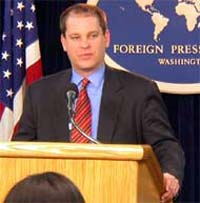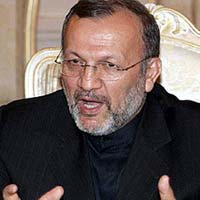|
Egypt Rejects West's Nuclear Double Standards
 |
|
Mubarak(R) during his talks with Cheney in Cairo.
|
CAIRO,
January 18, 2006 (IslamOnline.net & News Agencies) – Heavyweight
Egypt has echoed Saudi Arabia's stance on the current Iranian standoff
with the West, saying it supports international efforts to fight
proliferation of weapons of mass destruction, but criticized the West
for turning a blind eye to Israel's nuclear arsenal.
"Israel
must place its nuclear program under the supervision of the
International Atomic Energy Agency (IAEA)," Egyptian presidential
spokesman Soliman Awwad told reporters after talks between Egyptian
President Hosni Mubarak and visiting US Vice President Deck Cheney,
Al-Jazeera reported Wednesday, January 19.
Awwad
said a nuclear race in the Middle East carries disastrous consequences
for the entire region.
"We
have to bear in mind that the Egyptian public opinion rejects this
fuss over the Iranian nuclear program as it believes that the West is
papering over Israel's nukes," Reuters quoted him as saying.
The
UN nuclear watchdog had asked Israel to give up its secret
arsenal of nuclear weapons to head off an arms race in the
Middle East.
Awwad's
statements on Tuesday, January 18, echoed that of Saudi Foreign
Minister Saud Al-Faisal, who heaped the blame for the current Iranian
standoff squarely on the West for allowing Israel to build up a
nuclear arsenal over the years.
Both
Egypt and Saudi Arabia have called for resolving the current crisis
through the negotiating table.
Israel's
acting prime minister Ehud Olmert on Tuesday bluntly warned Iran that
Israel would not allow anyone who threatened the Israeli existence to
acquire weapons of mass destruction.
The
confrontation between Iran and the West came to a head last week after
Iran lifted IAEA seals from a key nuclear facility and announced its
intention to resume sensitive uranium enrichment research.
The
EU-3, Britain, France and Germany, declared their negotiations with
Iran dead and lined up behind a US call to bring in the UN Security
Council. But other countries, notably China and Russia, have been
cooler to tough action against Tehran.
Iran
claims that its nuclear program, and especially its making atomic
reactor fuel that can also be bomb material, is a peaceful effort to
generate electricity but the United States claims that Tehran is
hiding covert weapons work.
Talks
Ruled Out
 |
|
"I
don't think that we see anything that indicates the Iranians are
willing to engage in a serious diplomatic process," said McCormack.
|
France,
meanwhile, rejected on Wednesday, January 19, an Iranian proposal to
resume talks with Europe over its contested atomic program, saying
Tehran must first return to a full suspension of sensitive nuclear
activities.
"The
unilateral resumption of sensitive activities announced by Iran on
January 9 means it is not possible for us to meet in satisfactory
conditions to pursue these talks," foreign ministry spokesman
Denis Simonneau said, reported Agence France-Presse (AFP).
"Iran
must first return to a full suspension of these activities."
The
Iranians asked Tuesday the EU-3 to resume on Wednesday year-old
discussions on economic and other incentives to renounce their nuclear
plans.
The
United States said Tuesday Iran's offer to resume negotiations on its
nuclear program was mere "diplomatic fog" and barred new
talks without a concrete gesture from Tehran.
"The
onus is on the Iranians," State Department spokesman Sean
McCormack said amid intense diplomatic maneuvering over Western calls
to haul Iran before the UN Security Council for its suspected nuclear
weapons activities.
"At
this point I don't think that we see anything that indicates the
Iranians are willing to engage in a serious diplomatic process"
on the nuclear standoff, McCormack told reporters.
"It's
not on the EU-3 or the United States or anybody else to come up with
some other neat proposal for them to consider," he said.
"It
is on the Iranians now to take actions."
With
the EU-3 seeking an emergency meeting of the International Atomic
Energy Agency (IAEA) for February 2-3 in Vienna to discuss referring
Iran to the UN Security Council, Tehran has been seeking to restart
talks.
Referral
Certain
 |
|
Mottaki said there was only a "weak" chance of his country being referred to the Security Council.
|
European
diplomats said Wednesday Iran is almost certain to be referred to the
UN Security Council in February but sharp international divisions
about how to crack down on the Iranian nuclear program remain.
"One
way or another it will move to New York," a senior European
diplomat told AFP, certain that the United Nations watchdog
International Atomic Energy Agency will send Iran before the Security
Council when the IAEA's 35-nation board of governors meets in
emergency session in Vienna February 2-3.
But,
said the diplomat, referral "is not going to change the situation
really basically," referring to Russian and Chinese opposition to
the US and European desire to threaten sanctions or other harsh
measures in order to get Iran to guarantee it will not make nuclear
weapons.
The
West has a majority of some 21 votes on the 35-member board, and
Iranian allies Russia and China are expected to abstain when the
Iranian issue comes up.
But
in New York, Russia and China each have a veto on the Council.
US
envoy to the UN John Bolton said in New York on Tuesday that the
Iranian nuclear crisis was a key test for the Council, and warned
there was no guarantee a consensus would be reached on how to deal
with Tehran.
But
Iran's Foreign Minister Manouchehr Mottaki said Wednesday there was
only a "weak" chance of his country being referred to the
Security Council and warned the European trio not to take any
"hasty steps".
Iranian
national security spokesman Hossein Entezami repeated the threat that
if Iran is referred to the Council, IAEA inspectors would lose their
current level of access to the Islamic republic's nuclear facilities
and Iran would resume full-scale uranium enrichment work -- which
remains frozen for the time being.
Iran
has also threatened to use the oil it supplies to the already
overheated world market as a weapon to retaliate for measures against
its nuclear program.
|